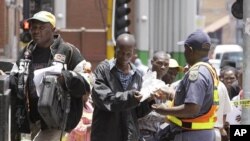The South African government has finished processing applications from more than 250,000 Zimbabweans seeking permission to live and work in South Africa. The South African government has indicated that starting next month, any Zimbabwean in the country without authorization could be deported.
More than 100,000 Zimbabweans who applied last year to live and work in South Africa have already been given permission to stay, according to officials in the Department of Home Affairs.
A further 176,000 Zimbabweans applied by the deadline of last December 31 to stay in the country.
Those cases have been decided, according to Jacob Mamabolohead, who heads the Zimbabwe Documentation Project within Home Affairs. However, Home Affairs has not said how many Zimbabweans were accepted or rejected, and many of the applicants do not know the status of their application.
A civil rights group, People Against Suffering Oppression and Poverty, or PASSOP, says it hopes there will be no mass deportations.
PASSOP director Bram Hanekom says he fears that if home affairs officials begin looking for illegal Zimbabweans, this could spark another round of xenophobic attacks. Several illegal migrants living in South Africa were killed in a wave of xenophobia three years ago.
“It wouldn’t be logical, it would put too much pressure on the South African situation. We are already continually combating xenophobia and tensions in certain areas,” said Hanekom.
Hanekom said it would not be in the interests of either South Africa or Zimbabwe for mass deportations of those who failed to secure the right to work in South Africa.
Hanekom said many Zimbabweans in South Africa send money home each month to support their families.
He also said that Zimbabwe's frail economy would be destabilized if thousands of Zimbabweans were forcibly sent back home.
“Zimbabwe’s current situation would obviously be put under immense pressure if large numbers of people were returned to Zimbabwe," he said. "Economically, Zimbabwe would be put under more pressure because the remittances would be reduced.”
The home affairs department says there will be no “mass deportations” of Zimbabweans who failed to secure work permits. But officials have not ruled individual deportations.
Tara Polzer Ngwato, a migration expert from the Africa Centre in Johannesburg, said deportation was traumatic and expensive, and experience showed that many Zimbabweans who were previously sent home from South Africa found ways of returning because they could not survive at home.
Hundreds of thousands of Zimbabweans have made their way to South Africa in recent years to escape their country's political turmoil and an economy that was ravaged by hyperinflation. Some reports put the number of illegal Zimbabweans in the country at more than one million, but the exact number remains unclear.




